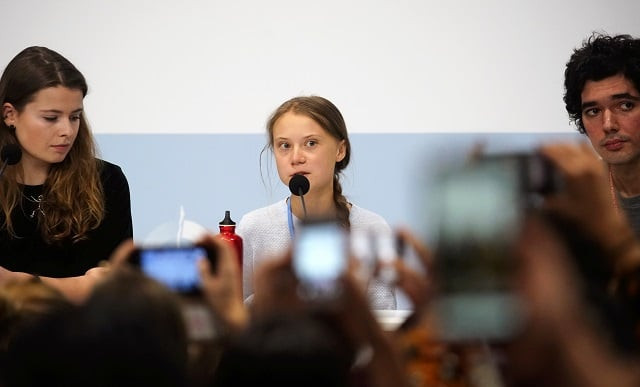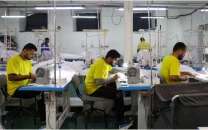Greta Thunberg highlights indigenous struggle at UN climate summit
Activists argue that their communities contribute almost none of fossil fuels emissions driving climate change

Climate change activist Greta Thunberg speaks during a news conference during COP25 climate summit in Madrid, Spain. PHOTO: REUTERS
Pursued by a media scrum ever since arriving at the two-week conference last week after crossing the Atlantic by catamaran, Thunberg stayed largely silent during her first official appearance at the summit, to allow a young Native American, a Ugandan, a Philippine and a Pacific islander to speak.
"Their rights are being violated across the world and they are also among the ones being hit the most and the quickest by the climate and environmental emergency," the teen climate activist said of indigenous communities.
“Climate change will not just affect us in the future, it is already affecting people in many countries today.”
Carlon Zackhras, from the Marshall Islands, said rising sea levels threatened his home, which is only two metres above the waterline.
"We are having to deal with issues we did not create," he said.
People are at risk from dengue infections and if adverse impacts of climate change continue people would lose their homes, he warned.
Kisha Erah from the Philippines said almost half of her country was highly exposed to cyclones and tsunamis.
Activist from Moscow, Arshak Makichyan said he had been arrested for protesting against climate change in Russia. “I’m not afraid to be arrested, I’m afraid not to do enough”.
He said he thought Greta’s warning that “our house is on fire” had been a metaphor until he saw the large forest fires that had occurred last year around the world including Russia.
Rose Whipple, of the Santee Dakota, native to Minnesota in the United States, called for an approach based on tradition and technology.
"The climate crisis is a spiritual crisis for our entire world. Our solutions must weave science and spirituality and traditional ecological knowledge with technology," she said.
Hilda from Uganda spoke about Africa’s vulnerability and said they were suffering the most even though "they had not caused climate change."
She termed the actions of those in power as "environmental racism."
"While countries congratulate each other for their weak commitments the world is literally burning out," said Chilean activist Angela Valenzuela.
The indigenous youth ended the press conference with a special prayer for the future of the planet.
The meeting to address the implementation of a 2015 pact struck in Paris to limit temperature rises to well below 2 degrees celsius was shifted to Madrid after riots over inequality broke out in Chile, which had been due to play host.
The low-lying Marshall Islands became the first nation to comply with a requirement in the Paris Agreement to increase its planned emissions reductions in 2018, a move bigger emitters are under pressure to follow by 2020.
With additional input from Reuters



















COMMENTS
Comments are moderated and generally will be posted if they are on-topic and not abusive.
For more information, please see our Comments FAQ